#autism guide
Text
The beginner autistic guide to common terms in our community (with extra context!).
*Disclaimer, I’m not a professional. This is just knowledge from my experience as an autistic person. Please feel free to correct anything :)
These definitions will include some of my own opinions and thoughts, especially on the more controversial terms. This is simply to help better prepare new autistic community members for conversations they become engaged in. Having all the perspective and context you can have can be very helpful when moving into new social spaces.
Autism (Or Autistic Spectrum Disorder, ASD): A neurodevelopmental disorder that is present from very early childhood. It’s mostly recognised through difficulties with social interaction and restricted and/or repetitive behaviours. The way it is referred to as “Autism Spectrum Disorder” is specifically referring to the fact that autism presents in countless ways. There are common traits and patterns, but the severity and complexity of those traits and symptoms is infinite.
NOTE: This does not mean that ‘everyone is a little bit autistic’. You are either autistic or you are not. It just means that if you have autism, it may present very differently to other autistic people you know.
Asperger’s Syndrome: Asperger’s syndrome is usually considered an older term for a ‘subtype’ of autism. The term is considered outdated by the DSM-5 and no longer used in that document. However it is still used in a lot of other countries. Now it is becoming more socially known that ‘Asperger’s syndrome’ is just a specific presentation of autism. Many autistics don’t like the use of the word ‘Asperger’s’ because of a couple reasons:
The term has a long history with NAZI’s and eugenics.
The term seems to basically mean ‘high functioning’ autistic, which simplifies the condition.
Asperger’s Syndrome is defined in a very similar way to autism, however people with “Asperger’s’ may be described as ‘gifted’ or ‘intellectual’.
It’s important to note that many people still identify themselves with the term ‘Asperger’s’. While it is good to be educated and up to date with terminology, some people have identified with this term their whole life and it’s not wrong to use the term for one-self. But either way, I do encourage you to do more research if you are comfortable.
Neurotype: Can be basically defined as the type of brain function one has. Some people consider autism a neurotype, and then neurotypical as another neurotype. However, many people claim that autism is ‘just another neurotype’. This is a harmful way of thinking about autism because autism is a disability. Labelling it as a ‘neurotype’ belittles all the struggles autistic people have that make them disabled. Autism is a spectrum and so some autistic people may not really consider themselves disabled, but many do.
Neurotypical (NT): A non-autistic person with no other mental conditions.
Allistic: A non-autistic person who can still have other mental conditions, such as depression or ADHD.
Neurodivergent (ND): Traditionally ‘Neurodivergent’ has been used to mean either autistic or ADHD. However in some contexts it is used to mean someone with any mental condition, including personality disorders or mental illnesses such as depression and anxiety.
Neurodiversity: a term used to describe the fact that there are many neurotypes in the world. It is used to imply that differences in brain development and function should be accepted as relatively normal. I think this is a good sentiment, but that some neurotypes should still be considered disabilities as well as a neurotype, so as not to diminish the struggles specific neurotypes go through.
High functioning/Low functioning: The labels of functioning are terms used to describe how independent an autistic (or other kind of disabled) person is able to be. Many autistics do NOT like the use of these terms for a couple reasons:
It tends to focus on the way an autistics disability affects the allistic people around them.
It simplifies the experience of the individual with autism to how independent they are, and is also not very descriptive for anyone trying to help the said autistic person.
High needs/Low needs: These are labels used to describe how much assistance an autistic (or other kind of disabled) person may need. It is slightly preferred by autistic people as the language is more centred to what the autistic person needs, rather than how independent they can be.
NOTE, many autistic people would argue that these terms are basically the same as high functioning and low functioning. I personally consider it to be best to just state someones highest needs or difficulties. For example “Olivia is nonverbal and highly sensitive to light and noise.”.
Masking: Masking is the act of hiding ones autistic traits to appear to be neurotypical. Masking is often a survival strategy developed by autistics to evade bullying or isolation. Masking can include suppressing the urge to stim, forcing oneself to make eye contact, learning how to ‘properly’ execute facial expressions, studying body language, etc. Masking can be an extremely vital skill for autistic people, but when an autistic person has to mask for long periods of time it can lead to negative consequences such as burn out or meltdowns. Masking can also be used in the context of other disabilities, such as ADHD.
Scripting: Scripting is a form of masking, when an autistic person pre-plans or practices responses or entire conversations. You may have a script you unconsciously follow for questions like “how are you?” Or “how is work?”, etc. It may be inspired from TV shows, movies or observing other people interact.
Burn out: Burn out is when an autistic person reaches their limit and has decreased energy for an extended period of time. Burn out may last anywhere between a couple days or a few years. Burn out is often caused by excessive masking, but can also be caused by repeated rejection, bullying or other mental conditions. Burn out is not the same as depression, but it can co-exist with depression.
Meltdown: A meltdown is when an autistic person experiences what might look like a ‘tantrum’. The person may be very angry, yelling, punching or hitting things (or themselves). They may be aggressively stimming or humming to themselves. A meltdown, internally, feels as if you are completely filled with negative energy, as if you might burst. It can feel like extreme irritation, or anger, or shame. Meltdowns can be caused by any number of stressful situations. For an autistic person this can be having a lot of social events, their routine being disrupted, having to eat foods they don’t like, being overstimulated, or even just negative social interactions.
Shutdown: A shutdown is very similar to a meltdown, in how it can be caused. For me personally, I tend to have a shutdown if I am not in a safe place to have a meltdown. From the outside it looks very similar to dissociation, and it can co-exist with dissociation. It typically feels like you are shutting down, turning off. You emotions were about to burst and then you just went numb. You may be unable to move, or go non-verbal. You may be crying quietly or you may simply just very suddenly feel the need to go home.
NOTE: Meltdowns and shutdowns can appear to feel like a panic attack, but they are different. Panic attacks come from intense feelings of dread or doom. Meltdowns and shutdowns come from repeated, or intense, stressful situations for an autistic.
Hypersensitive: Hypersensitivity is when the brain processes sensory input (such as touch, taste and smell) as much more intense than a neurotypical person would. This can mean that a slight cold breeze may feel painfully cold. Or looking outside a window can hurt ones eyes because it feels too bright. Or having to wear specific textures to stay calm.
Hyposensitive: Hyposensitivity is the opposite of hypersensitivity. It is when your brain inteprets sensory input as much less intense than a neurotypical would. Ways this can present in an autistic person include not realising when they hurt themselves, having a high pain tolerance, being unaware of temperature changes, etc. You may also not recognise your bodies hunger cues, dehydration or need for sleep.
NOTE: An autistic person can experience both hypersensitivity and hyposensitivity. It can also fluctuate day-to-day.
Sensory Processing Disorder (SPD): SPD is basically the term for experiencing lots of variation in your sensory input. It is similar to Auditory processing disorder. Which is where your hearing is technically fine (you aren’t any form of deaf), but you have trouble distinguishing what specific sounds are, or listening to one, important sound, in an area with lots of different noises (for example, being unable to understand what someone is saying next to you, because the TV is on.)
Overstimulation: This is when an autistic person has been experiencing too many different sensations at once, or for an extended period of time. This may be caused by too many noises happening at once. Or even just one annoying sound repeating for a long time. It can also be triggered by touch, taste, sight and smell.
Executive function/dysfunction: Executive function is the term used to describe how the brain initiates tasks. For neurodivergent folk, our executive function is often dysfunctional. This means we can often find it difficult to start new tasks. A way you may experience it is when you are sitting down, you may be screaming internally that you need to go and get some food, but your body seems unwilling to co-operate. Having executive dysfunction does not mean you are lazy, or do not want to do the task, it means you may be unable to do the task.
Autistic intertia: Autistic inertia is related to executive dysfunction, because it is a term that helps describe how autistic people struggle to switch or initiate tasks. “ An autistic at rest remains at rest, and an autistic in motion remains in motion”.
Special interest/Hyperfixation: A special interest is a extremely long term interest/obsession with a particular topic. An example might be being really into pokemon. Learning all the different types of pokemon, playing all the games and collecting heaps of merch. A hyperfixation is a more short-lived interest that can be destructive in it’s severity (for example, it might get so extreme that it’s the only thing you can think about, to the point where you neglect your needs). Special interests are less likely to be destructive. But hyperfixations can be healthy and normal too.
Stimming: Stimming or self stimulation is the act of doing repetitive movements to help self regulate. Stimming can look like spinning, chewing, flapping hands, dancing, foot tapping, pen clicking, touch soft fabrics, using weighted blankets, lighting candles, eating crunchy snacks, etc. All of these forms of movement or repetitive sensory input can help us regulate our emotions better, prevent a meltdown or shutdown, or focus on a task easier.
NOTE: Echolalia is another term you may hear. It is a form of stimming in which an autistic person repeats sounds/phrases over and over.
ADHD: Attention-deficit/hyperactivity disorder is a neurodevelopmental disorder like autism, but it affects the brain in different ways. It often presents as having difficulties with paying attention, regulating emotions and hyperactivity (or, alternatively, it can present as being inattentive).
Savant or Savant syndrome: A condition when someone with some type of significant mental disability is an expert/’savant’ in a particular field, to the point of surpassing neurotypical experts. An example might be having photographic memory, or being able to learn languages extremely easily, or being an extraordinary mathematician. Autistic people often don’t like to hear the term ‘savant’ as we are often only valued by ‘society’ if we are savants. And if we are not, then we are often treated as lesser. This is kind of a form of eugenics.
Eugenics: Eugenics is a philosophy or belief that we can selectively breed humans to ‘improve’ humanity. Or create the ‘perfect race’. This was an idealogy practiced by Adolf Hitler during WWII, which lead to the holocaust. Eugenics is often a subtly underlying philosophy behind many statements that, on face value, seem relatively harmless. For example - “autism is the next step in evolution” is currently a popular statement. However, this implies that every other neurotype is not an improvement, which therefore implies that being autistic is superior. This would be considered a form of eugenics. Eugenics is considered a horrible philosophy because it encourages people to look down on others and dehumanise anyone not like themselves.
Co-morbidity: A co-morbidity is the term used for a condition that is regularly seen in conjunction with another condition. For example, autism and ADHD are often seen together. However, it can also be used to simply describe someone who has more than one condition (physical or mental).
AuDHDer: Someone with autism and ADHD. Just a shortened way to refer to people with both disabilities.
Selective mutism/Situational mutism: When an autistic person (or other neurotype) experiences periods of being unable to speak or communicate. This can often occur in stressful situations, like before tests or during doctors appointments. It is officially referred to as ‘selective mutism’ but many are trying to change it to ‘situational mutism’ as the individual does not willingly choose when they go non-verbal.
Alexithymia: Alexithymia is typically described as the inability to define and/or describe ones emotions. So you may often feel a type of discomfort, but not be able to label what it is. Not being able to distinguish between anger and irritability. Or not knowing if you feel sad or confused. It can make seeking professional help for many conditions really difficult, as you are unable to put your experience into words. It can also be similar to hyposensitivity in the way that it makes it difficult to understand what you body is feeling.
Dyspraxia: Dyspraxia is a disorder that affects co-ordination, movement and balance. It can make things such as sports, driving, cooking and writing difficult. It is fairly common in autistic people.
Prosopagnosia: The inability to recognise/remember faces. It is more common in autistic people.
Synesthesia: Synesthesia is when one form of sensory input is sometimes also experienced as another. For example, someone with this condition may see colours when they hear someones name. They may hear a song and get a taste in their mouth. This is also more common in autistic people.
FINAL NOTE: Autism is a spectrum and you may not experience all of these different terms, or you may not experience them in the way I described them. That does not mean you aren’t autistic. This is not a diagnostic tool. This is simply a guide to learning the terms you may often hear when discussing autism.
#autism guide#autism#ASD#autism spectrum disorder#terminology#autistic terms#definition#neurodivergent#neurodiversity#allistic#aspergers#alexithymia#prosopagnosia#dyspraxia#actually autistic#synesthesia#auDHD#ADHD#autistic inertia#situational mutism#selective mutism
1K notes
·
View notes
Text
As an adhd person I just want to say that I love every autistic person on this website.
You guys are literally the best fandom archivers out there. I’m so serious.
If you are new in just about any fandom search for the one autistic person whose special interest your newfound fandom is and it’ll be like you just met god at a nightclub.
You guys are too powerful and I thank you for your service from the bottom of my heart.
#autism#autistic community#special interest#neurodivergent#neurodivergency#adhd autism solidarity#adhd#fandoms#new to fandom#tumblr guide#advice#i‘m so serious though… I used to be part of a tiny fandom and there was one lady who had archived everything about the people in question#it has been her special interest for 16 years - she‘s in her late 30s now#and that woman is on such a different level of obsession and I love her so much for it#don‘t care for that fandom anymore but I still sometimes read her blog because she inspires me#never stop being yourself
620 notes
·
View notes
Text
How to Make Friends
A more-or-less clear guide on social interactions
Growing up with heavy ADHD and generalized anxiety, it was always a bit hard for me to make friends and socialize. Despite my yearning for friendship, I was always "the quiet one" and "a loner", simply because I didn't know how to approach certain social situations, and it made any friendship I had extremely unstable (except for my sister @vive-le-quebec-flouffi, who was so extroverted and friendly it was literally impossible to escape her clutches of socialization)
As I grew older, I learned through a lot of trial and error what makes a good friendship.
Or, rather... what's the best way for someone to WANT to be your friend (without being superficial or hypocritical.)
Now, obviously, this doesn't work for everyone. But this is what I found helped me the most in social circles (especially online) and I hope it can help others too
LET'S BEGIN!
1 - Be yourself
Now that sounds very cliche and cringe, I know, but hear me out, because my opinion on this is not the same as all those feelgood inspirational movies and ads.
"Being yourself" isn't as simple as it seems. Because after all, what does "self" imply? If someone is, say, a criminal, would "be yourself" mean that they should embrace their sinful side?
No, obviously not.
"Be yourself" is a bit more nuanced, but I'll try to boil it down for you.
It just means "be unashamed of your qualities which you think are flaws". For example, "be yourself" would apply to someone who sees themselves as ugly, or maybe someone with an odd yet unharmful hobby, or a weird sense of fashion, or someone with say a handicap, a speech impediment. "Be yourself" is a sentence for the specific people who have genuine good in them, but are afraid to show it to others because they have been persecuted in the past, or are scared to be. It does NOT mean to accept genuine flaws. "Be yourself" does not include say violent anger issues, an addiction, a recent crime committed, or a generally unpleasant personality. Those are obviously not things to encourage. You can understand they may be a thing that happen to you, and accept it in your life, but that's different from being proud of it or encouraging it.
Speaking of personalities... let's talk about that
2 - Be kind
Now when some people hear that, they think it means "always smile no matter what, always look happy and positive, always agree with everyone just so you don't hurt their feelings, and never cause any drama", like you're Deku in My Hero Academia or Steven Universe in his titular show.
But that's... not quite that.
Obviously, kindness is something you use to help people feel better, to cheer up, and feel happy, and obviously to be kind, you need to have compassion, heart, empathy, and always put yourself in other people's shoes regardless of who they are. But it is not necessarily all-encompassing.
There's a rule that I think anyone learning kindness must learn. It's that sometimes, kindness means to be firm.
Not mean, of course. Not judgmental, not insensitive. Don't insult anyone, don't belittle or patronize anyone or make them feel inferior to you. That's still very rude and that's not what you want.
But what I mean is that sometimes, if you know that a person's actions towards something are wrong, especially if it's towards someone else, you must be able to point it out, and act accordingly. Don't just stand there and agree with them just because you don't want to hurt their feelings. You must still be able to know right from wrong. Kindness just means you won't be an ass about it, it doesn't mean to stay silent.
Hey, that brings me to point three!
3 - Show your own opinions
If there's one thing people hate just as much as meanness, it's those who stand by and do nothing about it.
Regardless of if you agree with them or not, if you say absolutely nothing when genuinely bad behaviour is happening, out of fear of "starting a fight", you are actively making the person who is being attacked feel alone.
I remember myself, when I was bullied in the first two grades of secondary school (11-13 years old for those who don't know) for "being ugly", I was told by my mother (who was friends with other kid's parents) that some of the kids "didn't hate me" and "didn't agree with the bullying". And I asked her "if they don't hate me, why won't they talk to me?" She never managed to answer that one. And it broke my heart, because outside of my sister, I had no one else.
Don't be like that. You may be scared of acting, but you know who would be grateful if you did act? The victims. And isn't their opinion of you much more important than the opinion of someone who acts with hatred and bigotry?
If you see someone suffering injustice, or even just hear someone who has a rather harmful opinion, don't be scared to tell them that you disagree. Obviously don't be an asshole about it, stay civil, but if you voice out your opinion, you will be seen as someone who stays true to their beliefs and is brave enough to stand up for them if the opportunity comes.
There's obviously much more that comes with social life (nonverbal cues, sense of humor, timing and mood), and I don't know everything (I'm just some random québécois girl on the internet). But I hope this was a bit more helpful. I did have fun writing this, at least. So I guess that's better than nothing!
#life hacks#tips#tips and tricks#useful#How to guide#How to#social media#social anxiety#anxitey#anxiété#adhd#actually adhd#adhd problems#neurodivergence#neurodivergent#neurodiversity#autism#autistic things#autistic adult#growing up autistic
463 notes
·
View notes
Text

NOW WHO EXACTLY ARE THESE CLOWNS?
blue beetle II, aka theodore "ted" kord, was created by steve ditko and first appeared as a backup feature in 1966 in charlton comics' captain atom series. he later got his own short-lived solo, before the charlton heroes were acquired by DC in the mid-80s and integrated into the DC universe via the crisis on infinite earths crossover event. ted had a solo run in the 80s, but is perhaps best known for being a central and founding member of the justice league international, where he met his lifelong best friend booster gold.
booster gold, aka michael jon carter, was created by dan jurgens and first appeared in his 1986 solo series as the first new major character introduced to the post-crisis DC universe. booster soon joined the justice league international, and has since had two really good solos and featured prominently in 52. he's most well known as the fame-hungry time-travelling hero with a heart of gold, as well as the blue beetle's best friend.
together, they're known for being fun-loving heroes, the personification of the 'bwa-ha-ha' era of the justice league, and one of the best friendships in the DC universe.
i've compiled a catalogue of every single comic appearance of both of these characters, as well as highlighting what i consider 'essential' blue & gold reading. each issue is also marked with whether they're both in it, whether/to what degree they interact, content warnings, and my own personal notes (some of which might even be useful to people other than me).
read it, use it, share it with your friends, and please enjoy!
WELCOME TO MY TWISTED MIND
#boostle#blue beetle#booster gold#ted kord#michael jon carter#reading guide#dc reading guide#dc comics#justice league international#the hours of work that have gone into this... the hundreds and hundreds of comics i had to read...#the organising... the agonising... the autism...#but it was all worth it for my beautiful beautiful spreadsheet my pride and joy my baby#idgaf if this is a bad time for posting IM IMPATIENT!!!!#please god let this show up in tags now
1K notes
·
View notes
Text
Rapunzel’s tangled adventure’s guide to sofas!

#varian tangled#varian#rapunzles tangled adventure#rapunzel#eugene#eugene fitzherbert#tts cassandra#lance strongbow#rta#tangled#tangled series#alignment chart#sorta?#it’s more like a guide#this is so funny#none of them can sit properly#they all have autism#or#adhd#probably#I’m just looking for tags now
696 notes
·
View notes
Text

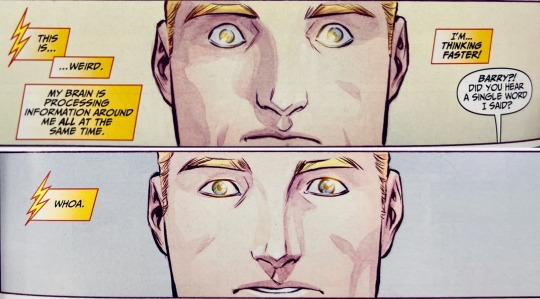







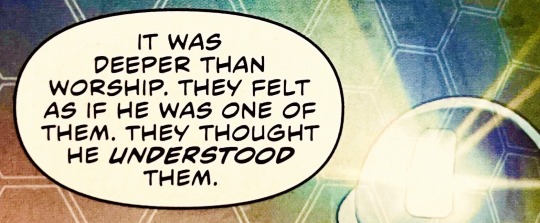


if there’s one thing barry writers love, it’s themes of neurodivergence and being othered
#panels#dc#the flash#barry allen#adhdposting#autisms#meta#danbles#long post#the way his explanation for how isolating and othering the speedforce feels to him#is then followed by ‘why did i let him put on that suit? and why did i think it would be red?’#he finally has someone he feels could understand him#that he could in turn guide with their shared unique experience and perspective#and he went ahead and projected all of that onto wally :((#i have GOT to find out what wally’s pov is on the speed force bc ik it’s very different
310 notes
·
View notes
Text
The World: You gotta figure things out on your own. Nobody's gonna hold your hand throughout your life.
Me: BUT I WANT THEM TO. WHY WON'T YOU HELP ME 😭
#i hate this#I hate being forced into independence#i hate having to figure out life on my own#i hate not having anyone to guide me through life because im supposed to learn on my own#idk if this is an autism thing or not#actually autistic#autistic problems#autistic black girl#black neurodivergent#black autistic#autizzy#jay's tism thoughts#autism#autism things#being autistic#neurodivergent problems
134 notes
·
View notes
Text
alright, time for some DIY mental conditioning!
step one- find a music artist that you like listening to. This should NOT be your favourite artist because you may not to get to listen to them often anymore. It’s also easier if it’s rather niche, so that you’re unlikely to just hear it out and about.
step two- you will listen to this artist ONLY when you clean or do other chores. It’s important that you don’t listen to it while relaxing, that’ll undermine the whole operation. But having it play gives you an incentive to be productive, because it’s your only chance to listen to this music, and also helps you associate particular music with getting up and doing things
step 3- once the association is well and truly there, then this music can be a useful tool to make you start on chores. When you play the music, you’re put into a productive mood and sort yourself out. It’s crucial that you don’t then start ignoring the music, because then it won’t work as well.
uh, disclaimer, I genuinely don’t know if this’ll work for anyone else, but it’s worth a try if you really struggle with chores and stuff.
#autism#neurodivergent#actually autistic#asd#autistic#adhd#adhd brain#adhd things#neurodiversity#neurodivergence#tips#life hacks#advice#guide
141 notes
·
View notes
Text
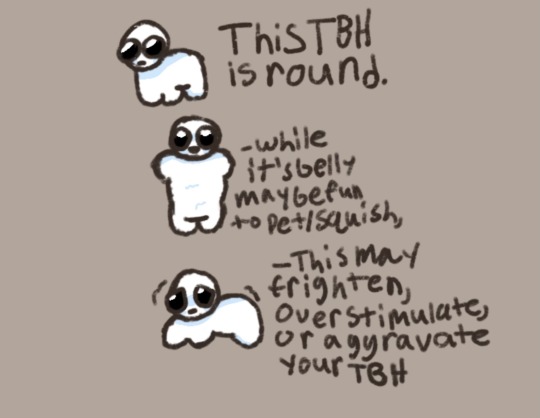
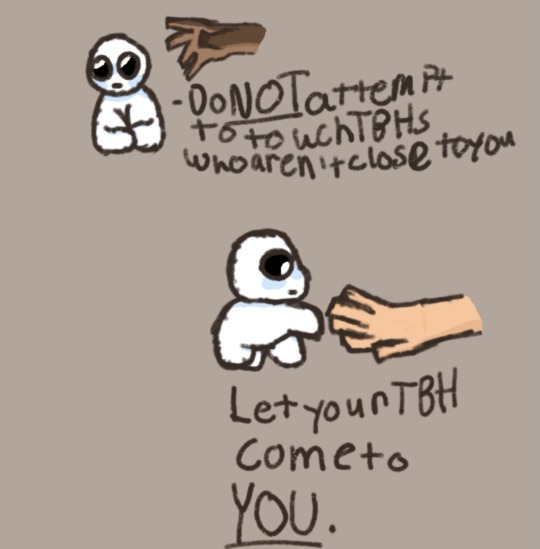
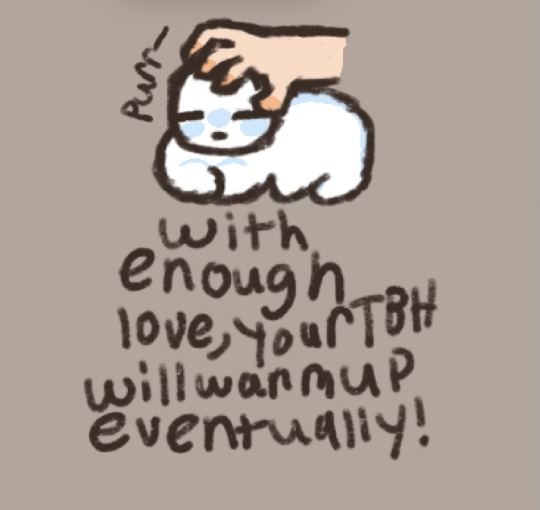
How to take care of a TBH creature!
#tbh creature#tbh autism#autism#diagnosed autistic#undiagnosed autistic#self diagnosed autism#autism creature#neurodivergent#neurodiversity#tbh creature care guide#first post#on this blog anyways#Its a side blog don’t know if I’ll go through with it more but yeah#here it is#and here I go
189 notes
·
View notes
Note
Willowpelt sounds SO autistic, it not being funny wraps around into being funny again.
My secret is being so autistic and so surrounded by so many other autistic people that I forget what tismless people even do. Everyone in BB ends up getting a touch of ADHDautism. As a treat.
But yeah when I was jotting it down I realized it too. Like wow, I really hit this one with the autism beam. Me and you, Willy, we will both have adamantine opinions. I cannot condone your hatred of apples but you do have a good point about oak trees.
#Me and Willow are going to have the funniest relationship about those apples#Like wtf girl you haven't had good apples. No i wont force them on you but you're so wrong#It cant even be a texture thing if youre NOT weird about pears#What the hell kind of apples are you eating that are always a little bitter#Fennelposting#My partner has an inverse autism to mine#Which at one point we called dog and cat autism#Because im mr THEY ASKED FOR NO PICKLES#PREPARE FOR 30 MINUTES OF PICKLE RELATED INFODUMPING IN PENANCE#And theyre like If i accidentally make eye contact with a single person in the room i will run away to a monastary and breed pea plants#Which ngl i think would be the funniest way to write Whitewillow#Fire: white is the best choice for deputy! He's so wise and organized and knows exactly how to talk to people#White looks up from his detailed gamefaq guide on How To Win At Talking To Real People which he wrote himself#'I Would Be Honored Thank You.'#Hes organized because if anything is even slightly different he hears The Sirens go off in his brain lmao#Small says 'firestar is still cursed bc he was appointed after moonhigh. I dont respect his deputy either.'#Willow: 'you will join starclan in 7 days but ill make sure ur not late'
97 notes
·
View notes
Text
Big emotion identification guide for autistic adults.
Hello! So this post is a guide to how I personally identify different big, negative feelings and how I differentiate between them. Please feel free to add/correct anything on here!
PANIC ATTACK - A panic attack can sound like an extremely vague ‘thing’ to autistic people. But for me, I can specifically identify it when my symptoms feel extremely physical. My vision goes blurry (with or without tears), I feel hot or cold, I shiver or shake, I can feel my heartbeat racing, I feel dizzy/like I’m about to pass out. It also classically comes with a sense of extreme dread. Like something really bad is going to happen/will happen. I also find that I usually get them when I am nervous about something happening later on. Like going to a party or a job interview. However I have also gotten them when I am scared of being misunderstood, or before intimate times with my partner. This is not an autism-specific term. Panic attacks usually last for less than a day, usually less than an hour. But you may have days where you get many panic attacks in a row. After a panic attack you may still feel extremely anxious, or you may feel really tired. Panic attacks can be normal in some situations, such as a traumatic event, however you should see a doctor about panic attacks if you can.
MELTDOWN - A meltdown can sometimes feel similar to a panic attack. It can be very physical in how it feels. However for me it has some distinct differences AND different triggers. For me a meltdown can feel so intense. I feel uncomfortable in my own body, like I want to scream and run around and hit things. Sometimes I may hit myself on the head, chest, arms or legs. It can feel like something is bubbling up inside me and I’ve just exploded. For me it can be triggered by my routine being different, having too many things on at once, being over-tired, being hungry or sensory overload. You may also experience temporary loss of speech. This is an autism-specific term. A meltdown usually lasts less than an hour, but it can also be triggered by panic attacks or other strong emotions. Usually after a meltdown I feel exhausted and don’t have another one for at least a day. Meltdowns are normal for autistic people, but if you are having them consistently it may be worth checking with your doctor.
SHUTDOWN - A shutdown is like an inward meltdown. Instead of exploding it can feel like you are imploding. From the outside it can look like you are perfectly fine. Or you may just seem to go really quiet. But for some you may cry or hide, or perhaps isolate. For me this is usually triggered by similar things to a meltdown, but the difference is, for me, is that it happens in a space where I cannot safely express myself. An example might be, being gaslit at the doctors may cause me to have a shutdown. I also often lose my speech during shutdowns and meltdowns. This is also an autism-specific term. Like a meltdown it usually lasts less than an hour (but can last longer). I also usually just feel really tired after a shutdown and don’t normally have another one for at least another day. Shut downs are normal for autistic people, but if you are having them consistently it may be worth checking with your doctor.
DISSOCIATION - Dissociation can happen to anyone, like a panic attack. It usually presents as “spacing out”. From the outside you usually look quiet and like you are just staring off into space, or daydreaming. Dissociation usually feels like nothing. As if you just go numb and are no longer present in the moment. You may have memories or daydreams, but not really feel attached to anything or yourself. It can be caused by a trigger to a specific traumatic memory, or just happen randomly to a mentally healthy person too. Dissociation can also look like (from the outside) you are just living your normal life, but you just don’t feel present. Dissociation can be complex and varies a lot person-to-person so you may want to research this term more. Dissociation is not an autism-specific term. It can last anywhere from a few minutes to even a couple months in some cases. Dissociation can be normal in small doses. Like if you dissociate for a few minutes every now and then that can be fine. But if it is interfering with your daily life you should see a doctor about it.
DEPRESSION - TW for this one ❤️ Depression is chronic emotional pain. It can present as chronic sadness, chronic anger, chronic numbness. It can make daily tasks difficult and it can feel like the world is on your shoulders. Everyone feels sad every now and then, or feels sad from specific events in your life, but it becomes depression when it is chronic. Meaning you experience negative emotions more often than not, or an unusually large amount of time. It can make it hard to get out of bed, socialise, go to work etc. Many people are still able to ‘function’ while depressed. Depression can also cause s*idical thoughts and thoughts about self h*rm. Depression is not an autism-specific term but autistic people are likely to experience depression. Depression can last anywhere from a few months to an entire lifespan. If you feel depressed you should seek help from a medical professional and please reach out to family and friends to help you.
ANXIETY - Anxiety is experiencing chronic fear and/or anxiety. Again, anyone can have a panic attack or experience anxiety from specific situations, but the condition of anxiety is when it becomes a chronic, almost-everyday feeling. It can be specific. Such as social anxiety or agoraphobia (fear of unknown/public/exposed spaces). Anxiety can last anywhere from a few months to an entire lifespan. Anxiety is not an autism-specific term but autistic people are likely to experience it. If you feel constant anxiety you should seek help from a medical professional and please reach out to family and friends to help you.
SENSORY OVERLOAD - Sensory overload is when you are experiencing too much sensory input at one time, or over an extended period of time. An example may be you are too hot, someone is chewing loudly and you are hungry. This can be an example of having too much intense sensory stimulus at once. It can lead to meltdowns and panic attacks. Sensory overload is often painful for autistic people. Loud noises may feel like your ears are being stabbed, being hungry may feel like your stomach is twisting in knots. For autistic people we often experience sensory processing disorder. This means that normal/typical sensory input is processed as either a lot more intense, or a lot less intense, than a neurotypical person would experience it (hyper-sensitivity and hypo-sensitivity). Sensory overload is sometimes an autism-specific term, but it has been adopted more widely. It can be experienced at any time and for any length of time. Sensory overload is normal for autistics.
ANGER/RAGE - Anger and rage can be hard for autistic people to identify which is why I have included it. It can feel similar to a meltdown, in the sense that it feels like something is bubbling inside you and you feel like you need to physically express the feeling by either hitting something or screaming. It can be caused by seeing or experiencing what you perceive as injustice, unfairness, bullying, or even just simple rudeness. For me I experience a lot of anger while driving in heavy traffic, or trying to learn a new, tedious skill (like sewing or playing a difficult video game). I use experiences like that a frame for how anger feels in my body. This is not an autism-specific term and is just a regular emotion like happiness or sadness that comes and goes. It does not require any professional help unless you are constantly angry/it is interfering with daily life.
#autism guide#autistic adult#autism in adults#identifying emotions#asd#actually autistic#autism spectrum disorder#neurodivergent#disabled#disabled adult#sensory overload#panic attack#anxiety#depression#oc
18 notes
·
View notes
Text

Today’s Autistic character of the day is:
Arthur Dent from The Hitchhiker's Guide to the Galaxy
Requested by @waitafrikk
#headcanon#arthur#arthur dent#arthur the hitchhiker's guide to the galaxy#arthur hitchhiker's guide to the galaxy#arthur hitchhiker's guide#arthur dent the hitchhiker's guide to the galaxy#arthur dent hitchhiker's guide to the galaxy#arthur dent hitchhiker's guide#the hitchhiker's guide to the galaxy#hitchhiker's guide to the galaxy#hitchhiker's guide#autism#autistic#actually autistic#autistic characters#autistic character of the day
78 notes
·
View notes
Text
"Ford! Hello, how are you?"
"Fine," said Ford, "look are you busy?"
"Am I busy?" exclaimed Arthur. "Well, I've just got all these bulldozers and things to lie in front of because they'll knock my house down if I don't, but other than that... well, no, not especially, why?"
They don't have sarcasm on Betelgeuse, and Ford Prefect often failed to notice it unless he was concentrating. He said, "Good, is there anywhere we can talk?"
- The Hitchhiker's Guide to the Galaxy by Douglas Adams
God he's so autistic i love him so much
#ford prefect is genuinely one of the characters ever#ford prefect#hitchhiker's guide to the galaxy#book#books#book quote#douglas adams#autism#autistic
71 notes
·
View notes
Text
Ford Prefect is relatable because when he came to earth he needed to study the way humans socialize. What is appropriate to say in which situations, what is too long for a handshake or a hug, how close you have to be with someone to touch them and why do men just barely hug each other besides when greeting or saying goodbye.
70 notes
·
View notes
Text

More ocs for a book that may or may not come to light yay!
#art tag#oc#oc art#we'll see where this goes theyve been in my brain for ages now#and i do have the actual draft set up and the worldbuilding guide in the works because im extra#if anyone is wanting an autism creature and a loudmouth adhd rogue romance youve come to the right place
25 notes
·
View notes
Text
It's so wild anytime people say that Alhaitham is a quiet person because while he may enjoy silence, he also spends 90% of the time he is on screen infodumping at us. This man will not shut up.
#genshin impact#alhaitham#he's got that dawg in him#the dawg is autism#seriously even in his demo they ask him a question and he goes on about how#he doesnt need to fight if he just thinks harder#here let me explain#the others are literally like 'ok thats nice please stop'#he gives us all the exposition in the AQ and i'm fine with it because he would just explain everything all the time#when you wanna avoid people coming to the wrong conclusion so you have to lay out a step by step guide#to your entire thought process
34 notes
·
View notes